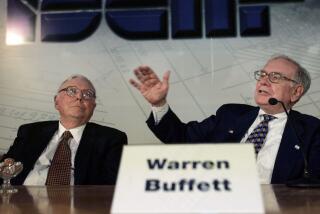Enron Is but a Pebble in the Wave
- Share via
As expected, former Enron chief Ken Lay invoked the 5th Amendment and refused to answer questions Tuesday on Capitol Hill.
But much has been spoken about him: Fox News’ Bill O’Reilly compared him to Al Capone; Newsweek’s Martha Brant to Osama bin Laden. Lay surely did wrong, but at the same time, he had the right idea.
What idea was that? Trading electricity like every other commodity. That’s a good idea because only markets bring supply and demand into equilibrium, thus preventing shortages and surpluses. Only markets bring new ideas into production, and that’s the essence of economic growth.
A look back at business history suggests that bad people often are part of good trends. In the 19th century, for instance, the Next Big Thing was railroads. A scandal involving Credit Mobilier, the holding company for Union Pacific Railroad, blew up in 1872, walloping Washington, even the White House. Yet that criminal fiasco did not derail the industry that connected the country.
Put simply, dynamic capitalism--the bringing together of buyers and sellers in a fast-changing environment--is risky. Even honest risk-takers are sometimes wrecked. Victor Niederhoffer was a successful commodities trader in New York in the 1980s; he wrote books about the business as well. And not long after he published “The Education of a Speculator” in 1996, he made a bad bet, and his $100-million hedge fund went bust.
In spite of these disasters, the trend toward trading continues. In the 1970s and ‘80s, sectors of the economy--notably transportation, financial services and telecommunications--were deregulated. In each case, the rush of new entrepreneurship brought controversy and occasionally criminality, but Americans ultimately were better off. At a time when more than half of Americans are online, for instance, it’s hard to think back just two decades, when telecommunications innovation meant a push-button phone.
Electricity deregulation will be a similar story of small steps, missteps, sidesteps and, ultimately, a great leap forward. Three decades ago, utilities were a series of state-regulated monopolies; not surprisingly, each outfit was sleepy and inefficient. In reaction, cost-conscious companies began to go off the grid, setting up co-generators and micro-turbines that enabled them to generate cheaper and more reliable power.
So it was the reality, not ideology, that forced deregulation. States such as Pennsylvania have been successful. In Philadelphia, homeowners who shop around for power save an average of $10 a month. Other states, including California, have botched their deregulation schemes and ended up saddling consumers with even greater costs.
But for all the storming and stressing over rival deregulatory plans, few suggest that it’s desirable or even possible to return to the old days of cozy cost-plus production. This same commodity-trading trend is visible everywhere. Russian electricity mogul Anatoly B. Chubais was in Manhattan recently, pitching investors on a plan for linking power grids across a Eurasian market, from Lisbon to Vladivostok. Some say that Chubais is a nogoodnik, but even if his proposal fails, someone’s will succeed.
The inevitability of a trend, of course, is not the same as the integrity of a specific firm. Enron was “a badly run commodity-trading company,” says Mallory Factor, a New York merchant banker. And of course, it may also prove to be a criminally run company.
But even if the top leaders of Enron all go to jail, the future still belongs to market forces. So says Jeremy Shane, a veteran utility industry trader: “In electricity, markets even out short-run peaks and troughs and bring lower overall prices in the long run.” Electricity cannot remain a lethargic island in a fast-flowing sea of competition.
As lawmakers match Lay’s legal silence with their own loud noise, the electro-deregulatory trend will quietly continue, because nothing can stop an idea whose time has come--not even a bunch of crooks.
*
James P. Pinkerton writes a column for Newsday in New York.
More to Read
Inside the business of entertainment
The Wide Shot brings you news, analysis and insights on everything from streaming wars to production — and what it all means for the future.
You may occasionally receive promotional content from the Los Angeles Times.










